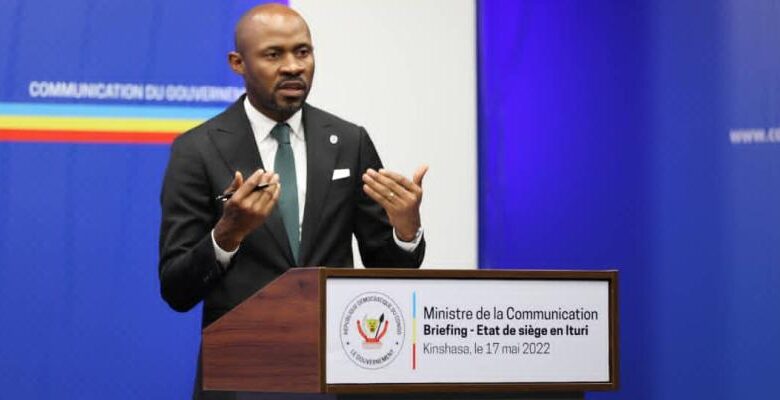DR Congo Insists On ‘Nairobi Process’, Other Conditions For Regional Peace
The Nairobi process is a conclave of the East African Community of heads of state conceived to find a solution to the war in the eastern DR Congo. The government of DR Congo has accused Rwanda of supporting M23 rebels in destabilising Congo.

The government of the Democratic Republic of Congo says it firmly holds to the Nairobi process to resolve the crisis in the eastern provinces of the country.
The Nairobi process is a conclave of the East African Community of heads of the state conceived to find a solution to the war in the eastern DR Congo.
The government of DR Congo has accused Rwanda of supporting M23 rebels in destabilising Congo.
“To us, the principle is what was said in Nairobi, which is that the M23 and all its supporters return to their initial positions,” Patrick Muyaya, the DR Congo Minister of Communication and Government spokesperson, said on Monday, July 18, during a press briefing.
“We do not have to singularly identify any form of negotiations or discussions with one armed group because we have started a process in Nairobi which involves all groups.”
The Minister said it was then that a group withdrew to do what it is doing now.
He insisted that the M23 rebels leave Bunagana following a ceasefire agreement in Luanda.
“So for now, we hold onto that, and whatever is said, before any progress, the M23 and its supporters must leave Bunagana.”
Speaking on the subject of the recent dispatch of a delegation by the DR Congo government to Kampala, Uganda, to meet President Yoweri Museveni based on the diplomatic actions being carried out by the Congolese government to find a solution to the conflict sparked off by the M23 rebels in the eastern Congo, Muyaya explained that the delegation that was led by the Congolese Minister of State for Infrastructures and Public Works, Alexis Gisaro was at the invitation of President Museveni.
“When we went to Luanda with the President of the Republic, I think it was 48 hours earlier that President Museveni contacted President Felix Tshisekedi to ask him to send a delegation to discuss with him the situation in the east and for him to propose ways to find solutions,” he said.
“The initiative to go to Kampala was not an initiative from Kinshasa.”
” To this end, President Tshisekedi, considering first of all the discussions we had with President Joao Lourenco (of Angola) with the Rwandan side, delegated the Minister of State for Infrastructures and Public Works.”
“Why? Because it was with him that we were some months ago in Pondwe in Uganda and Bunagana in our country, DR Congo, for the launching of construction work on the road.”
The minister, who dedicated a large segment of his press briefing to the Congolese delegation to Kampala, which is the subject of criticism and controversy in DR Congo, revealed that Minister Gisaro was accompanied to Kampala by the chief of the Military Cabinet of the Head of State, General Franck Ntumba and General Ruasira Obed.
The envoy of President Tshisekedi said the Congolese government: has foreign support. We are conscious of your (Museveni’s) influence in the sub-region. We are convinced that it is difficult to find a solution without you.
To the Congolese authorities, President Museveni’s response to the Congolese delegation’s declarations was unclear.
Museveni had declared: We have been at war for a long time, 50 years, here in Uganda and neighbouring countries. If you want to win, you must fight a just war. Before morphing into conflict, sometimes wars come from politics.
President Museveni thinks that a solution to the crisis in eastern Congo can only be through a ceasefire.
“We can find a solution. You must learn from our long experience. My position is to find a complete solution, put a ceasefire in place, no fighting, the Kenyans will come, and we will find a solution,” President Museveni said.
However, President Museveni and President Tshisekedi do not have the same perception of the crisis.
The Congolese president does not want to engage in direct talks with the M23, which it considers a terrorist group.
President Museveni prefers the method of politics and dialogue, which is not very far from that of President Paul Kagame of Rwanda.
But DR Congo has insisted on the Nairobi process to resolve the crisis.
DR Congo has continued to accuse Rwanda of supporting the M23 rebellion, which controls several villages and Bunagana in Rutshuru territory.
President Joao Lourenco of Angola, who had offered to mediate, had summoned Felix Tshisekedi and Paul Kagame to find a solution to the crisis. However, despite a ceasefire, fighting continued between the two sides before the relative calm was witnessed during the last few days.
Support Our Journalism
There are millions of ordinary people affected by conflict in Africa whose stories are missing in the mainstream media. HumAngle is determined to tell those challenging and under-reported stories, hoping that the people impacted by these conflicts will find the safety and security they deserve.
To ensure that we continue to provide public service coverage, we have a small favour to ask you. We want you to be part of our journalistic endeavour by contributing a token to us.
Your donation will further promote a robust, free, and independent media.
Donate HereStay Closer To The Stories That Matter




